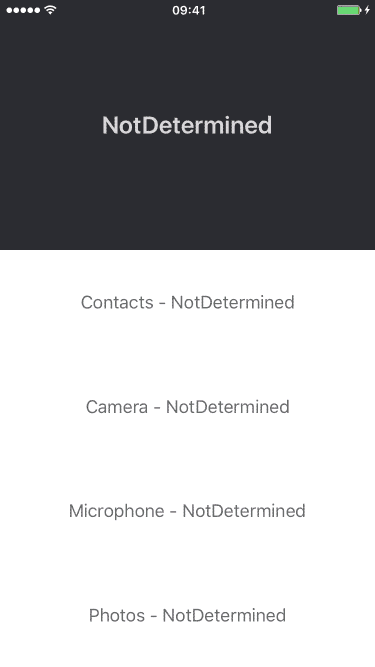Permission exposes a unified API to request permissions on iOS.
Usage • Example • Installation • License
let permission: Permission = .Contacts
print(permission.status) // PermissionStatus.NotDetermined
permission.request { status in
switch status {
case .Authorized: print("authorized")
case .Denied: print("denied")
case .Disabled: print("disabled")
case .NotDetermined: print("not determined")
}
}Supported permissions:
AddressBook(Deprecated in iOS 9.0)BluetoothCameraContactsEventsMotionMicrophoneNotificationsPhotosRemindersLocationAlwaysLocationWhenInUse
When you first request a permission, a system alert is presented to the user.
If you request a permission that was denied/disabled, a PermissionAlert will be presented.
You might want to change the default title, message, cancel and settings text:
let alert = permission.deniedAlert // or permission.disabledAlert
alert.title = "Please allow access to your contacts"
alert.message = nil
alert.cancel = "Cancel"
alert.settings = "Settings"In order not to burn your only chance of displaying the system alert, you can present a pre-permission alert. See this article for more informations.
permission.presentPrePermissionAlert = true
let alert = permission.prePermissionAlert
alert.title = "Let Foo Access Photos?"
alert.message = "This lets you choose which photos you want to add to your Foo profile"
alert.cancel = "Not now"
alert.confirm = "Give Access"The system alert will only be presented if the user taps "Give Access".
Use a PermissionSet to check the status of a group of Permission and to react when a permission is requested.
let permissionSet = PermissionSet(.Contacts, .Camera, .Microphone, .Photos)
permissionSet.delegate = self
print(permissionSet.status) // PermissionStatus.NotDetermined
// ...
func permissionSet(permissionSet: PermissionSet, willRequestPermission permission: Permission) {
print("Will request \(permission)")
}
func permissionSet(permissionSet: PermissionSet, didRequestPermission permission: Permission) {
switch permissionSet.status {
case .Authorized: print("all the permissions are granted")
case .Denied: print("at least one permission is denied")
case .Disabled: print("at least one permission is disabled")
case .NotDetermined: print("at least one permission is not determined")
}
}A PermissionButton requests the permission when tapped and updates itself when its underlying permission status changes.
let button = PermissionButton(.Photos)PermissionButton is a subclass of UIButton. All the getters and setters of UIButton have their equivalent in PermissionButton.
button.setTitles([
.Authorized: "Authorized",
.Denied: "Denied",
.Disabled: "Disabled",
.NotDetermined: "Not determined"
])
// button.setAttributedTitles
// button.setTitleColors
// button.setTitleShadowColors
// button.setImages
// button.setBackgroundImages
// etc.- sunshinejr/RxPermission RxSwift bindings for Permissions API in iOS.
class PermissionsViewController: UIViewController, PermissionSetDelegate {
override func viewDidLoad() {
super.viewDidLoad()
let label = UILabel()
let contacts = PermissionButton(.Contacts)
let camera = PermissionButton(.Camera)
let microphone = PermissionButton(.Microphone)
let photos = PermissionButton(.Photos)
contacts.setTitles([
.NotDetermined: "Contacts - NotDetermined"
.Authorized: "Contacts - Authorized",
.Denied: "Contacts - Denied"
])
contacts.setTitleColors([
.NotDetermined: .blackColor(),
.Authorized: .greenColor(),
.Denied: .redColor()
])
// ...
let permissionSet = PermissionSet(contacts, camera, microphone, photos)
permissionSet.delegate = self
label.text = String(permissionSet.status)
for subview in [label, contacts, camera, microphone, photos] {
view.addSubview(subview)
}
}
func permissionSet(permissionSet: PermissionSet, didRequestPermission permission: Permission) {
label.text = String(permissionSet.status)
}
}Carthage is a decentralized dependency manager that automates the process of adding frameworks to your Cocoa application.
You can install Carthage with Homebrew using the following command:
$ brew update
$ brew install carthageTo integrate Permission into your Xcode project using Carthage, specify it in your Cartfile:
github "delba/Permission"
CocoaPods is a dependency manager for Cocoa projects.
You can install it with the following command:
$ gem install cocoapodsTo integrate Permission into your Xcode project using CocoaPods, specify it in your Podfile:
use_frameworks!
pod 'Permission'Copyright (c) 2015-2016 Damien (http://delba.io)
Permission is hereby granted, free of charge, to any person obtaining a copy of this software and associated documentation files (the "Software"), to deal in the Software without restriction, including without limitation the rights to use, copy, modify, merge, publish, distribute, sublicense, and/or sell copies of the Software, and to permit persons to whom the Software is furnished to do so, subject to the following conditions:
The above copyright notice and this permission notice shall be included in all copies or substantial portions of the Software.
THE SOFTWARE IS PROVIDED "AS IS", WITHOUT WARRANTY OF ANY KIND, EXPRESS OR IMPLIED, INCLUDING BUT NOT LIMITED TO THE WARRANTIES OF MERCHANTABILITY, FITNESS FOR A PARTICULAR PURPOSE AND NONINFRINGEMENT. IN NO EVENT SHALL THE AUTHORS OR COPYRIGHT HOLDERS BE LIABLE FOR ANY CLAIM, DAMAGES OR OTHER LIABILITY, WHETHER IN AN ACTION OF CONTRACT, TORT OR OTHERWISE, ARISING FROM, OUT OF OR IN CONNECTION WITH THE SOFTWARE OR THE USE OR OTHER DEALINGS IN THE SOFTWARE.




